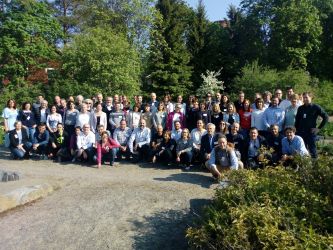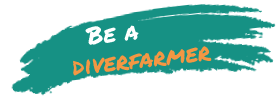Over 50 European researchers, technicians, farmers, and companies review the latest advances of the Diverfarming project in Finland and share the preliminary results of the measurements from the experimental stations.
Finland has hosted the third annual meeting of the European Diverfarming project, integrated by 25 scientific institutions, companies and agrarian organisations led by the Universidad Politécnica de Cartagena (Spain) and financed by the European Commission within its Horizon 2020 programme. At the main headquarters of the Natural Resources Institute Finland Luke in Joikionen, the scientific team has been able to take stock of the first two years of work and fine-tune the parameters and indicators that are being used to measure the effects of diversification on the sustainability of agrarian systems to improve the productivity of the systems, the environmental benefits and the value chain during these three days. In this sense, Diverfarming seeks to provide proof regarding the environmental impact of abandoning monocropping and adopting a new agricultural paradigm based on multiple crops and low inputs. To do so, the team take measurements throughout 25 lands located in six countries of six principal edaphoclimatic areas: North Mediterranean, South Mediterranean, Atlantic, Continental, Boreal and Pannonia, indicators such as the production, the harvest quality, the biodiversity, carbon sequestration to mitigate climate change, the content of nutrients or the microbiology of the soils, as well as the economic costs and benefits, comparing them with those recorded in areas of monocropping.
 During their annual meeting, the leaders of the project’s different work packages have been able to present their first results, as well as detailing the problems that the measurements are presenting, with the idea of adjusting their methodologies. The ultimate objective is to be able to provide enough data to European and state Administrations to enable appropriate decisions to be made in their respective agrarian policies and to transfer the most efficient diversifications and farming practices from an economic and environmental point of view, to the farmers.
During their annual meeting, the leaders of the project’s different work packages have been able to present their first results, as well as detailing the problems that the measurements are presenting, with the idea of adjusting their methodologies. The ultimate objective is to be able to provide enough data to European and state Administrations to enable appropriate decisions to be made in their respective agrarian policies and to transfer the most efficient diversifications and farming practices from an economic and environmental point of view, to the farmers.
In this sense, the meeting held in Finland, which has gathered together 76 researchers, technicians and advisors, has served to present the main lines of the new communication strategy of the project, designed by the Scientific Culture Unit at the University of Cordoba to create new farmers communities around
Diverfarming committed to practising the agricultural model that is proposed. Under the slogan of “Be a Diverfarmer”, Diverfarming embarks on its definitive transformation into a citizen science project, involving the agricultural community in the decision taking and experimentation.
Diverfarming is a project financed by the Horizon 2020 Programme of the European Commission, within the challenge of “Food Security, Sustainable Agriculture and Forestry, Marine, Maritime and Inland Water Research and the Bioeconomy”, which counts on the participation of the Universities of Cartagena and Córdoba (Spain), Tuscia (Italy), Exeter and Portsmouth (United Kingdom), Wageningen (Netherlands), Trier (Germany), Pecs (Hungary) and ETH Zurich (Switzerland), the research centres Consiglio per la ricerca in agricoltura e l'analisi dell'economia agraria (Italy), the Consejo Superior de Investigaciones Científicas (Spain) and the Natural Resources Institute LUKE (Finland), the agrarian organisation ASAJA, and the companies Casalasco and Barilla (Italy), Arento, Disfrimur Logística and Industrias David (Spain), Nieuw Bromo Van Tilburg and Ekoboerdeij de Lingehof (Netherlands), Weingut Dr. Frey (Germany), Nedel-Market KFT and Gere (Hungary) and Paavolan Kotijuustola and Polven Juustola (Finland).










